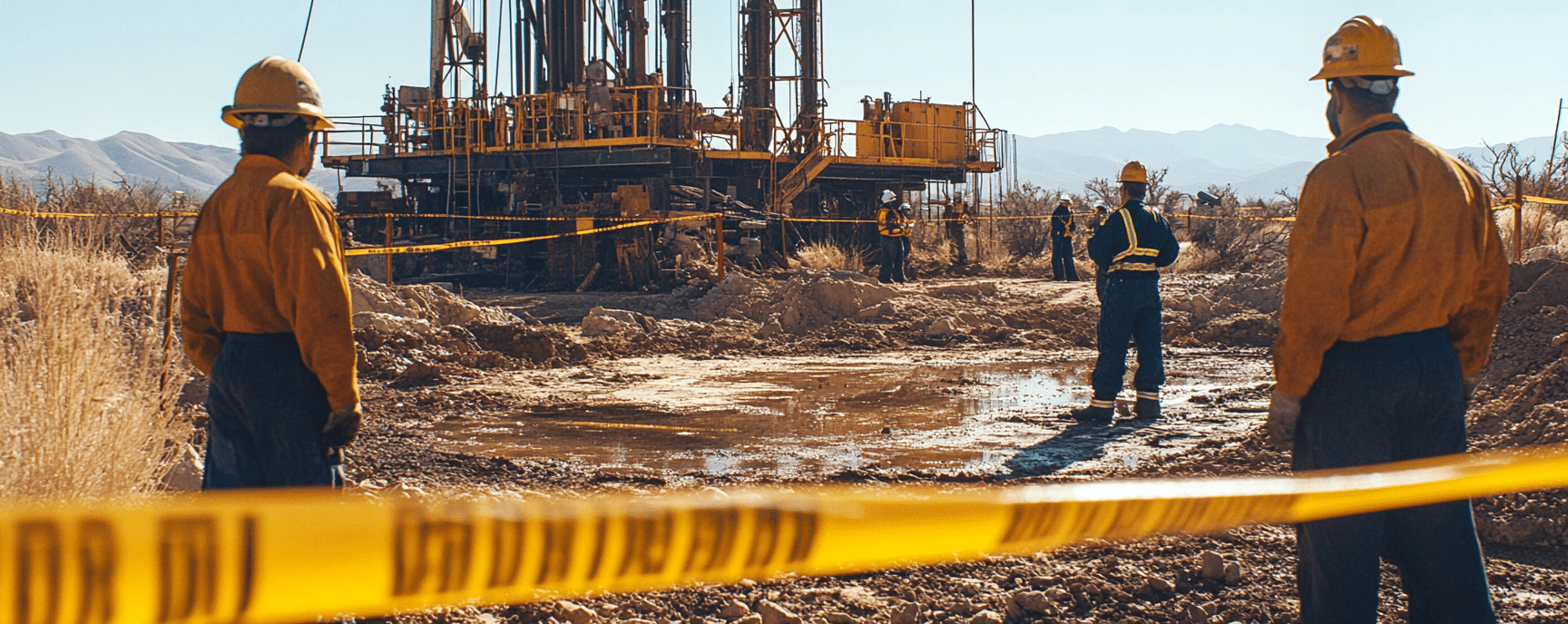Key Takeaways
- Oil field workers should immediately seek medical attention and report injuries to employers to enhance their chances of successful claims.
- Texas workers’ compensation offers benefits for work-related injuries, but employees may not sue their employer for damages outside the compensation system if the employer participates in workers’ compensation.
- Texas employers that don’t participate in the workers’ compensation system can be sued by injured employees if the employer was negligent or otherwise caused the injury.
- Injured workers can pursue third-party claims for additional compensation beyond claims against their employer, necessitating the documentation of evidence and identification of liable parties.
Let's Go Beyond, to Bring You Back
Let's get you the compensation you're entitled to. Get a FREE Consultation today.
Let's Go Beyond, to Bring You Back
You deserve the compensation you’re entitled to, call for your FREE Case Review today.
Understanding Oil Field Injuries
Oil field work is an inherently high-risk occupation, often leading to severe injuries. In regions like Texas, the oil industry is synonymous with accidents and personal injuries.
When an injury occurs, workers should seek immediate medical attention and report the incident to their employer. Prompt action can significantly impact the success of any subsequent workplace injury claims.
Common Injuries in the Oil and Gas Industry
The oil and gas industry is notorious for its hazardous working conditions. Common injuries include burns, fractures, and injuries from falls. Workers are also at risk of explosions, heavy machinery accidents, and exposure to toxic chemicals, which can lead to serious injuries. Toxic exposure can cause respiratory problems, chemical burns, and long-term health issues.
Additionally, confined space entry poses significant risks, including potential exposure to toxic atmospheres.
Immediate Steps After an Injury
After an injury in the oil field, the first step is to seek medical attention. Reporting the incident to your employer or supervisor is essential, as failing to do so can jeopardize your claim for compensation.
Document everything related to the injury, including medical bills and accident-related expenses. Collecting evidence, such as photographs of the accident site and witness contact information, can significantly strengthen your case.
Claims Against Employers for Oil Field Injuries
In Texas, injured oil field workers can make a claim for a workplace injury against their employer either under the Texas workers’ compensation system (if the employer is a subscriber) or by making a personal injury claim if the employer doesn’t participate in the workers’ compensation scheme. Workers’ compensation is designed to cover medical expenses and lost wages resulting from work-related injuries. Likewise, a personal injury claim can provide compensation for medical costs, lost wages, and pain and suffering. Which avenue is available to a worker depends on whether the employer has opted into the workers’ compensation system or not.
Subscribing Employers

Prompt reporting of the injury is essential, as failing to do so can jeopardize the claim. Keeping records of all medical treatments and maintenance communications during the claims process ensures proper coverage.
Workers’ compensation represents a trade-off. Benefits under the system are typically less than what an injured worker could recover in a lawsuit.
But, unlike in a lawsuit, the worker generally need not show that the employer is somehow responsible for causing the injury.
There is one exception: if a worker is killed because of his employer’s gross negligence, the worker’s family and estate can bring a lawsuit because of the wrongful death of the worker, even if the employer is a subscriber and the family received workers’ compensation benefits. However, the only recovery allowed (beyond the ordinary workers’ compensation benefits) under these circumstances is “exemplary damages,” which are designed to punish and deter unsafe conduct by employers.
Nonsubscribing Employers
On the other side of the coin, when an employer doesn’t participate in the workers’ compensation system, they are known as a “nonsubscriber.”
When a worker is injured while employed by a nonsubscriber, they have the right to bring a claim against the employer in the courts and not in the workers’ compensation system. On the one hand, to win such a claim requires the employee to prove that the employer did something to cause the injury. This can be things like not providing adequate safety equipment, not properly training or supervising co-workers, or not keeping the workplace safe. But the worker can claim compensation for medical expenses, lost wages, and non-economic damages, and typically, the amount the workers can recover is far more than would be provided in the workers’ compensation system.
And, because Texas encourages employers to provide the “sure things” of workers’ compensation, the law prohibits nonsubscribing employers from making many of the arguments that defendants in other suits could make. For example, a nonsubscribing employer cannot escape liability because the workers contributed to causing the injury, unless the injury is totally the workers’ fault and the employer did nothing wrong.
Accident Lawyer
Get Compensated For Your Injuries & Damages! Call Us For A FREE Case Review And Know What Your Case Is Worth.
Third-Party Personal Injury Claims in the Oil and Gas Industry
Regardless of claims against any employer, injured oil field workers have the right to file personal injury claims against third parties who may have caused or contributed to causing the injury. Third-party injury claims can provide additional financial benefits beyond what workers’ compensation offers, covering medical costs, lost wages, and emotional distress.
Seeking legal action assistance helps navigate the complexities of injury claims and protects your legal rights effectively while pursuing an attorney.
When to File a Third-Party Personal Injury Claim
A third-party personal injury claim can be filed if a third party’s negligence or other misconduct directly contributed to the injury. This is regardless of whether the worker received workers’ compensation benefits; claims against third parties are not barred by the existence of workers’ compensation coverage.
Accidents can be caused by several factors. These include equipment failures, inadequate training, and unsafe working conditions. Many of these factors in the oil industry are under the control of third parties other than the workers’ actual employer. And thus, third-party personal injury claims exist in many oilfield injuries.
Evidence Needed for a Personal Injury Claim
To support a personal injury claim, various types of evidence are needed, including medical records, witness statements, and documentation of the incident. Medical records establish the extent and nature of the injuries sustained, while witness statements provide firsthand accounts of the incident.
Gather evidence, such as photos and witness information, promptly, is crucial to strengthen the injury claim.
Potential Compensation from Personal Injury Claims
Victims can seek a range of damages through personal injury claims, including medical expenses, lost wages, pain and suffering, and emotional distress. Economic damages cover medical expenses and lost wages, while non-economic damages address pain, suffering, and diminished quality of life.
Punitive damages may be awarded in cases involving egregious conduct, and wrongful death claims can cover funeral expenses and loss of companionship for a loved one.
Third-Party Liability in Oil Field Accidents
In oil field injury cases, there are potentially many third parties, such as contractors or equipment manufacturers, who can be held liable. If a third party is responsible for an oil field injury, the injured party may seek compensation from them in addition to workers’ compensation or a nonsubscriber claim.
This can include additional financial benefits for medical expenses, lost wages, and emotional distress.
Identifying Liable Third Parties
Identifying liable third parties is essential in seeking additional compensation. Equipment manufacturers are responsible for producing equipment that meets safety standards and warning about potential dangers. Contractors and subcontractors hold an independent duty to maintain safety and may be liable for accidents caused by their actions.
Third-party vendors can also be held accountable if their third party’s negligence leads to injuries.
Proving Third-Party Negligence
Proving third-party negligence often requires comprehensive documentation, such as safety compliance records and photographic evidence of the accident scene. Video evidence of equipment failure or witness testimony can establish the liability of equipment manufacturers in oil field accidents.
Documenting safety violations is essential in substantiating a personal injury claim.
Additional Compensation Opportunities
Third-party claims can provide injured oil workers with additional compensation beyond workers’ compensation benefits or a nonsubscriber claim. Compensation from third-party claims may include medical expenses, lost wages, pain and suffering, and emotional distress.
Liable third parties may include contractors, equipment manufacturers, and other entities that were involved in contributing to the injury.
Let's Go Beyond, to Bring You Back
Let's get you the compensation you're entitled to. Get a FREE Consultation today.
Let's Go Beyond, to Bring You Back
You deserve the compensation you’re entitled to, call for your FREE Case Review today.
Legal Guidance and Representation
Legal guidance is essential in navigating the complexities of oil injury cases. Workers are aware that they are protected against retaliation for reporting injuries or filing claims. Wyly & Cook offer expert assistance in understanding third-party liability and filing injury claims.
Their representation in Texas ensures that injured workers receive the compensation they deserve.
Choosing the Right Lawyer
Selecting the right lawyer can significantly impact the success of your oil injury claim. Consult a lawyer with experience in similar cases and a proven track record of successful outcomes.
Wyly & Cook work on a contingency fee basis, which means they only get paid if you win your case, reducing financial risk for injured workers.
The Role of a Lawyer in Oil Injury Cases
A lawyer with specialized knowledge in oil injury laws is crucial for effective representation. An effective oil injury lawyer should have specific experience handling cases relevant to the oil and gas sector.
Wyly & Cook support clients by collecting evidence, negotiating with an insurance company, and representing them in court if necessary. Securing maximum compensation is their top commitment, working on behalf of clients with serious injuries.
Contingency Fee Basis
Wyly & Cook operate on a contingency fee basis, meaning they only get paid if the client wins the case. This arrangement benefits injured workers by reducing the financial risk associated with hiring a lawyer to pursue compensation.
It ensures that legal assistance is accessible to those who need it most.
Statute of Limitations for Oil Field Injury Claims
Understanding the statute of limitations for oil field injury claims is essential for injured workers. The statute of limitations imposes strict deadlines for seeking legal recourse, ensuring claims are filed within a specific timeframe.
Missing these deadlines can result in the loss of the right to claim compensation.
Deadlines for Personal Injury and Third-Party Claims
In Texas, individuals have two years from the date of the injury to file a personal injury or third-party claim. In cases involving negligence, the two-year timeframe begins when the injured party discovers the injury or should have reasonably discovered it.
Failure to file a personal injury lawsuit within the statute of limitations can result in the loss of the right to seek any compensation.
Frequently Asked Questions
What are the common types of injuries in the oil and gas industry?
Common injuries in the oil and gas industry include burns, fractures, falls, toxic exposure, and accidents involving machinery. Addressing these hazards is crucial to ensuring the safety of workers in this sector.
What steps should I take immediately after an oil field injury?
Immediately seek medical attention for your injury, report the incident to your employer, document all details of the injury, and collect evidence, including photographs and witness contact information. Taking these steps is crucial for your health and potential legal claims.
Can I file a personal injury claim in addition to workers' compensation?
Yes, you can file a personal injury claim alongside workers’ compensation if a third party’s negligence contributed to your injury, or if your employer lacks workers’ compensation insurance. It is essential to identify all potential sources of compensation for your injury.
What is the statute of limitations for filing a personal injury claim in Texas?
In Texas, the statute of limitations for filing a personal injury claim is two years from the date of the injury. It is crucial to adhere to this timeline to ensure your right to seek compensation is preserved.
How can a lawyer help with my oil injury case?
A lawyer can significantly aid your oil injury case by gathering crucial evidence, negotiating with insurers, and representing you in court to secure maximum compensation. Their expertise ensures that you navigate the complexities of the legal process effectively.



